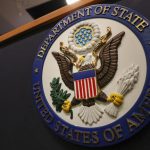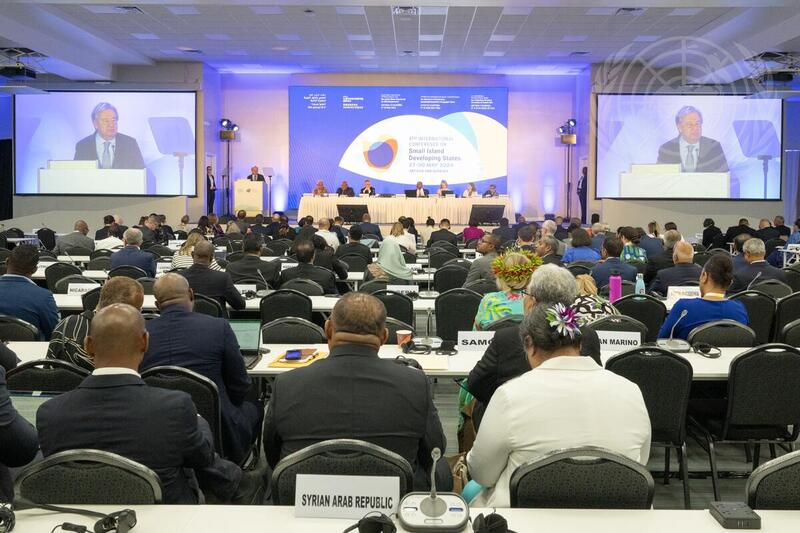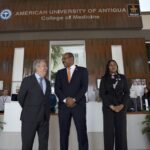Day 1 of SIDS4 Conference Concludes with Urgent Calls for Climate Action and Financial Reform
Antigua and Barbuda, May 2024 – The fourth international meeting of Small Island Developing States (SIDS), known as SIDS4, commenced with powerful speeches from key leaders, underscoring the critical challenges and opportunities facing these vulnerable nations. The conference, held in Antigua and Barbuda, brings together representatives from across the globe to address the pressing issues of climate change, financial instability, and sustainable development.
Prime Minister of Antigua and Barbuda, Gaston Browne, highlighted the unique vulnerabilities faced by SIDS, stating, “This is a crucial gathering at a time of unprecedented global challenges in which SIDS find themselves on the frontline of a battle against a confluence of crises, none of which they have caused or created.”
He emphasized the responsibility of large-scale emitters to compensate for their contributions to climate change, advocating for a global carbon tax on oil companies. Browne called for immediate action, saying, “We stand at the juncture where our actions and failure to act will dictate the fate of SIDS, as well as the legacy we leave for future generations.”
UN Secretary-General António Guterres echoed these sentiments, praising the resilience of SIDS while stressing their exceptional vulnerability. “Your unique geography puts you at the mercy of climate chaos, rising sea levels, and land degradation. We cannot accept the disappearance of any country or culture under the rising waves,” Guterres stated. He urged developed economies to fulfill their pledges for climate financing and advocated for deep reforms to the global financial architecture to better serve developing countries.
President of the General Assembly, Dennis Francis, reinforced the need for financial inclusion and substantive reform of the international financial framework. He lauded the leadership of SIDS in advancing global climate conversations, citing the recent historic ruling by the International Tribunal on the Law of the Sea, which recognized carbon emissions as a sea pollutant.
“This historic ruling obliges countries to mitigate their effects on oceans – potentially creating an important basis for future climate jurisprudence,” Francis remarked.
The SIDS4 conference aims to produce the Antigua and Barbuda Agenda for SIDS (ABAS), a renewed declaration for resilient prosperity. This agenda will address the multifaceted crises SIDS face, including climate change, economic repercussions from the COVID-19 pandemic, and mounting debt. The conference serves as a platform for proposing new partnerships and solutions to support SIDS in their pursuit of sustainable development goals.
As the conference progresses, leaders will continue to deliberate on innovative financing mechanisms such as the Debt Service Support Initiative (DSSI), which includes debt for climate swaps, green and blue bonds, and leveraging public-private partnerships. The adoption of the Multidimensional Vulnerability Index will also be crucial in enabling SIDS to access much-needed concessional financing and grants.
Day one of SIDS4 has set a decisive tone for the conference, emphasizing the urgent need for global solidarity and action to ensure the resilience and prosperity of Small Island Developing States.
About SIDS4:
SIDS4 is the fourth international meeting of Small Island Developing States, focusing on sustainable development progress and proposing new partnerships for resilient prosperity. Previous conferences were held in Barbados (1994), Mauritius (2005), and Samoa (2014). SIDS face unique economic, environmental, and social vulnerabilities, exacerbated by climate change and global crises.
SIDS Facts:
- Scientists forecast that a 2°C increase in temperature will lead to significant sea level rise, consuming 13,000 km² of Caribbean land.
- The Caribbean Community Climate Change Centre estimates continued climate inaction could drastically impact the region’s GDP.
- Globally, SIDS contribute less than one percent of greenhouse gas emissions yet face disproportionate climate risks.
- Tourism is vital to many SIDS economies, representing 20% of GDP in two out of three SIDS.
The SIDS4 conference continues to highlight the resilience and leadership of SIDS while calling for greater international support to address their unique challenges.










